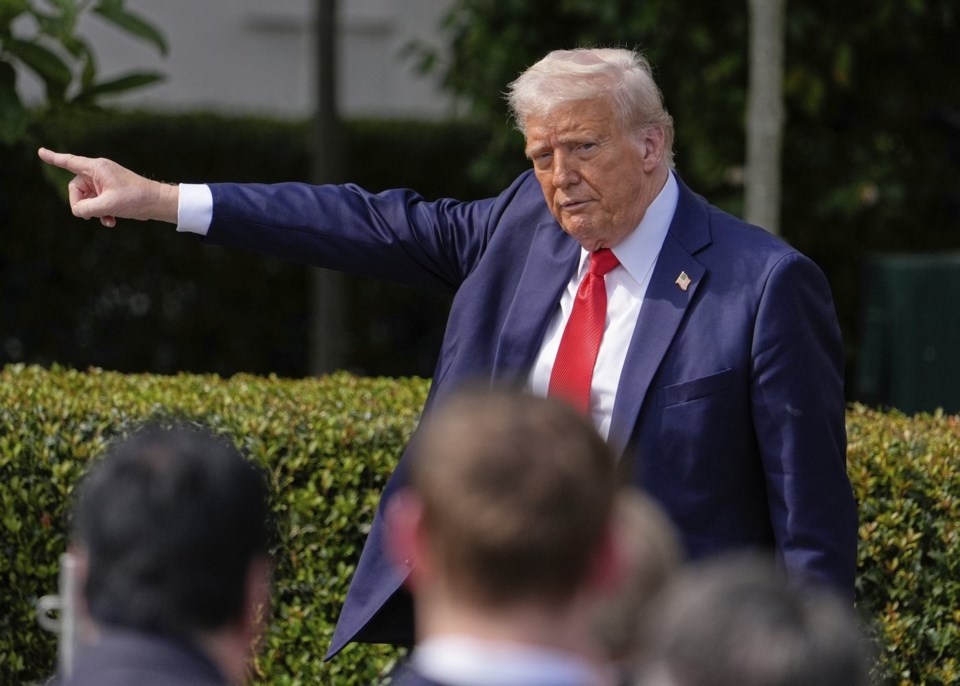WASHINGTON (AP) — President Donald Trump on Wednesday inserted himself directly into trade talks with Japanese officials, a sign of the high stakes for the United States after its tariffs rattled the economy and caused the administration to assure the public that it would quickly reach deals.
The Republican president said in a post on his social media platform that he’ll attend the meeting alongside Treasury Secretary Scott Bessent and Commerce Secretary Howard Lutnick, top economic advisers with a central role in his trade and tariff policies.
“Hopefully something can be worked out which is good (GREAT!) for Japan and the USA!” Trump wrote in the social media post.
The president's choice to get directly involved in negotiations points to his desire to quickly finalize a slew of trade agreements as China is pursuing its own set of agreements. It's an open test of Trump's reputation as a dealmaker as countries around the world seek to limit the potential damage unleashed by his import taxes.
The sweeping tariffs that Trump announced on April 2 triggered panic in the financial markets and generated recession fears, causing the U.S. president to quickly put a partial 90-day hold on the import taxes and increase his already steep tariffs against China to as much as 145%.
The pause temporarily spared Japan from 24% across-the-board tariffs, but there continues to be a 10% baseline tariff and a 25% tax on imported cars, auto parts, steel and aluminum exports.
With Japan charging an average tax rate of 1.9% on other countries' goods and having a longstanding alliance with the U.S., the talks on Wednesday are a crucial indicator of whether the Trump administration can achieve a meaningful deal that reassures the markets, American voters and foreign allies.
U.S. economic rival China, meanwhile, is trying to capitalize on the turmoil around Trump's announcements, with its leader, President Xi Jinping, touring nations of Southeast Asia and promoting his country as a more reliable trade partner.
Japan is among the first countries to start open negotiations with the U.S. Trump and other administration officials have said the phones have been “ringing off the hook” with dozens of countries calling, eager to strike deals with a president who views himself as a master negotiator to avoid tariffs when the 90-day pause ends. Israel and Vietnam have offered to zero out their tariff rates, but Trump has been noncommittal as to whether that would be sufficient.
Japan, like many other nations trying to minimize the possible economic fallout from Trump's tariffs, has been scrambling to respond. It has set up a special task force to assess the impact of the tariffs and offer loans to anxious companies.
Although Prime Minister Shigeru Ishiba has been working hard to coax exemptions out of Trump, the government has said little officially on what concessions it might offer during these talks.
Nor has the administration been transparent about its asks. The Trump administration is seeking to close the $68.5 billion trade deficit with Japan and seeking greater access for U.S. goods in foreign markets, yet the president has also insisted that tariff revenues can be used to pay down the federal budget deficit.
“Japan is coming in today to negotiate Tariffs, the cost of military support, and ‘TRADE FAIRNESS,’” Trump posted on Wednesday.
U.S. officials will be meeting in Washington with Japan’s chief trade negotiator, Economic Revitalization Minister Ryosei Akazawa.
“I am prepared for the talks,” Akazawa told reporters at Tokyo’s Haneda Airport before boarding his flight. “I will negotiate in order to firmly protect our national interest.”
He said that both Bessent and U.S. Trade Representative Jamieson Greer are “known to be pro-Japan and professionally talented” and that he hopes to build a relationship of trust with them.
“I believe we can have good talks toward a win-win relationship that will serve national interest for both Japan and the United States,” he said.
Japan has contended that Trump's tariff measures are likely to violate bilateral trade agreements or World Trade Organization rules. While Ishiba has said he opposes retaliatory tariffs, he also has said he is in no rush to push for a settlement because he doesn't want concessions.
Xi, meanwhile, stopped in Malaysia on Wednesday and told its leader that China will be a collaborative partner and stand with its Southeast Asian neighbors after the global economic shocks.
Xi is touring Vietnam, Malaysia and Cambodia this week on a trip that likely was planned before the tariffs' uncertainty but that he's also using to promote Beijing as a source of stability in the region and shore up relationships in that part of the world as he looks for ways to mitigate the 145% tariffs that Trump is keeping on China.
“In the face of shocks to global order and economic globalization, China and Malaysia will stand with countries in the region to combat the undercurrents of geopolitical ... confrontation, as well as the counter-currents of unilateralism and protectionism,” Xi said in remarks at a dinner with Malaysian Prime Minister Anwar Ibrahim.
“Together, we will safeguard the bright prospects of our Asian family,” he added.
Xi has promised Malaysia and Vietnam greater access to Chinese markets on his visits, although few details were shared.
In Washington, Trump has indicated that he also wants to discuss how much the Japanese contribute to the cost of U.S. troops stationed there, largely as a deterrent to China.
Trump’s demand for more defense spending concerns the Japanese.
Under its national security strategy, Japan aims to double annual defense spending to nearly $10 trillion, or 2% of GDP, in 2027, while there is a concern that Trump may ask for that to be increased to 3% of GDP. Japanese Defense Minister Gen Nakatani said Tuesday that the military budget for this year is about 1.8% of Japan’s GDP.
___
Yamaguchi reported from Tokyo.
Darlene Superville, Mari Yamaguchi And Josh Boak, The Associated Press



